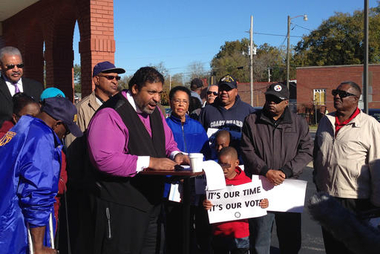Activists blanket North Carolina on early voting's final day

WILSON, N.C. (AP) — Voting activists and volunteers fanned out across the presidential battleground of North Carolina on Saturday's final day of early in-person voting to urge undecideds and the otherwise uninterested to cast ballots in close races for president, U.S. Senate and governor.
Union representatives, social and fiscal conservatives and gay rights and civil rights groups rallied, canvassed neighborhoods and staffed phone banks as early voting closed at 1 p.m. in all 100 counties. People in line at that time still were allowed to vote. Once the deadline passed, groups and the candidates themselves quickly pivoted their focus toward Election Day.
Preliminary early voting totals by mid-afternoon showed just over 3 million people have cast ballots in-person or by mail, a 10 percent increase over the previous record set in 2012, according to State Board of Elections data. For in-person voting alone, the increase was even higher at 13 percent. The numbers were expected to increase.
But percentages for Democratic and black voters remained lower compared to four years ago. Blacks comprised 22 percent of the early vote compared to 27 percent during the last presidential election, when Republican Mitt Romney won the state. Unaffiliated and Republican vote totals were higher compared to 2012.
Before a march in Wilson, about an hour east of Raleigh, NAACP state president the Rev. William Barber dismissed arguments that there's a lack of enthusiasm at the polls because President Barack Obama isn't on the ballot.
Barber blamed the lower total in large part on what he called Republicans' efforts to limit early voting hours in some counties and recent efforts by individuals to challenge voter registrations. A federal judge on Friday ordered registrations to be restored in three counties for what could be thousands of challenged voters.
"We better vote, simply because people have tried to take the right," Barber said outside a Wilson church. "The heart and soul of this national are truly on the ballot."
Marching down a street lined with black-owned barbershops and other businesses, Barber led a group of about 50 activists across the railroad tracks to the early voting site downtown, where at least 200 people were waiting in line by late morning. Among them were William and Nedra Parks, a black couple inclined to support Democratic candidates. Nedra Parks said Democratic nominee Hillary Clinton and Obama support many of the same policies.
"At 61, I've seen a lot of stuff and I've been through a lot of stuff," said William Parks, a mechanic at a plastics plant. "I've been through the Republicans and I've been through the Democrats ... and I feel like the Democrats are a little bit more important to black people."
In Republican-leaning Johnston County, activists with the conservative-leaning Americans for Prosperity carried computer tablets as they walked through a neighborhood of starter homes and tried to contact registered voters who, according to group data, vote irregularly but are aligned with the group's limited-government goals. AFP hung placards on doors urging people to vote against Democratic U.S. Senate candidate Deborah Ross. The placards cited her votes to raise sales taxes during her time in the General Assembly.
By midday, the group had already made 21,000 phone calls opposing Ross and knocked on 1,500 doors, state director Donald Bryson said.
The activists faced tough going in the Riverwood community — knocks on doors often were unanswered or met by barking dogs. They came across Kurt Bienias, 55, an Air Force veteran who said he initially didn't care for Ross or Republican incumbent Richard Burr. He thinks Burr has been in office too long and he isn't convinced that Ross fully supports veterans and respecting the U.S. flag. Anti-Ross groups have highlighted her time lobbying for the American Civil Liberties Union.
Bienias, a registered Republican, said he ended up voting for Burr to try to keep a counterbalance in Washington.
After watching so many TV ads, "I couldn't tell the difference between the two," Bienias said while taking a break from yard work. But "if Clinton does win, the last thing that I want is to have a Democratic Congress behind her."
Ross and Burr also campaigned Saturday, as did Gov. Pat McCrory and Democratic challenger Roy Cooper. McCrory spoke at Republican presidential nominee Donald Trump's afternoon rally in Wilmington.
_
Copyright 2016 The Gayly - 11/6/2016 @ 8:15 a.m.





